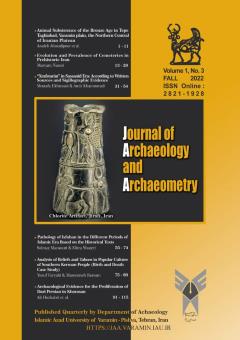“Xrafstarân” in Sassanid Era: According to Written Sources and Sigillographic Evidence
محورهای موضوعی : ArchaeologyMostafa Ekhtesasi 1 , Amir Khanmoradi 2
1 - Independent Researcher, Tehran, Iran
2 - Department of Archaeology, Bu-Ali Sina University, Hamedan, Iran
کلید واژه: Zoroastrianism, Pahlavi scriptures, Xrafstar, Sassanid Seals,
چکیده مقاله :
“Evil animals” (MP. xrafstar, Av. xrafstra-) are harmful animals created by Ahriman to assist in destroying the world. Pahlavi scriptures present fragments of knowledge on various types of xrafstarân, some regulations and recommendations on how to crush them, and examples of divine reward for those believers who eradicate these evil animals. However, Pahlavi scriptures put urging stress on eliminating xrafstarân, sigillographic evidence from the Sassanid era points to the other direction, showing that in many cases, the Zoroastrian principle of destroying evil animals is ignored, to the extent that images of venomous animals could be seen on seals and sigils belonging to Zoroastrian priests and other elites of the Sassanid era. While in some cases, themes depicted on seals are by the religious recommendations of scriptures, owners’ personal preferences seem to remain the main factor in displaying images on seals. This question remains that depicting an evil animal on a personal seal contradicts religious regulations in Zoroastrianism. This opposition could be caused by diversity in interpretations of scriptures or by the co-existence of various factions of Zoroastrianism. The presence of other religions all over the Sassanid Empire could be one more cause of this discord. Through a comparison between depictions on seals and Pahlavi scriptures, the current study concludes that several images of xrafstarân depicted on seals are related to religions other than Zoroastrian Mithraism, Judaism, Christianism, and even Gnosticism. Moreover, most Zoroastrian scriptures mentioning xrafstarân are written only after the Sassanid era. It seems likely that after the collapse of Sassanid dynastys, some Zoroastrian priests rearranged the classification of beneficent animals created by Ahura and evil animals created by Ahriman. Nonetheless, the vital role of geography and cultural diversity of each region of the vast Sassanid Empire could not be overlooked while studying the presence or absence of animal themes in depictions.


